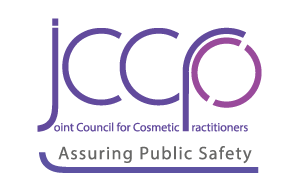JCCP issues new statement and update
 Professor David Sines, the interim chair of the Joint Council for Cosmetic Practitioners (JCCP) has issued an update and statement. It says:
Professor David Sines, the interim chair of the Joint Council for Cosmetic Practitioners (JCCP) has issued an update and statement. It says:
"As Interim Independent Chair of the Joint Council for Cosmetic Practitioners (JCCP), appointed in January 2016, I value the opportunity to update all stakeholders on progress made so far. There has been a huge amount of interest in the work of the JCCP and I value the debate that it has generated. I am also aware of the problems caused by both lack of information and misinformation that has been spread about its role and function. The JCCP is still in its formative stage and has only limited resources to respond to the many enquiries it is now receiving.
The JCCP has completed a major consultation exercise to reach out to the many interest groups and stakeholders that populate the profession with a view to seeking opinion relating to the operating principles under which the new Council will operate. Included in this process have been:
• All of the Professionally Regulated Statutory Bodies (PRSB’s) – GMC, NMC, GDC, GPhC, HCPC
• The Professional Associations working in the aesthetics field – BAAPS, BAPRAS, BAD, BACN, BCAM, PIAPA
• Suppliers of products and services – Pharma Companies, Pharmacies, Insurers
• Education and Training Providers
• OFQUAL – qualifications regulator
• Other voluntary registers – Save Face and Treatments You Can Trust
Let me state some of the key actions that have emerged so far that have informed the establishment of the new JCCP:
Standard Setting
Prior to the determination of any type of regulatory function an agreed set of ‘clinical and practise standards’ are required against which to benchmark and assess clinical competence, set standards of practice proficiency and to underpin accreditation and registration. To undertake the task of standard setting, a new independent body has been formed called the Cosmetic Practice Standards Authority (CPSA) that will set standards of clinical and practice proficiency for the non-surgical cosmetic sector. This body has started its work and will include representation across all practitioner sectors. It will seek to build on the framework established by Health Education England (HEE) and now owned by the JCCP. It is targeted to deliver the new standards by November 2017. Once the standards framework has been completed by the CPSA it will be used by the JCCP as the basis for the establishment of its Practitioner Register.
JCCP Status
The clear outcome of the Keogh Report and the HEE process was based on a decision from Government that there would NOT be mandatory regulation. I am fully aware that many of the medical professional associations will continue to campaign for higher level treatments to be made statutory. However, the HEE Report did support the idea of the industry developing its own self-regulatory system and the principle of establishing a ‘Joint Council’. This support led to my appointment as the Independent Interim Chair of the JCCP. Government backing for the newly proposed JCCP is based on a pre-condition that the process for the development of the JCPP should be inclusive of all practitioners of non-surgical treatments (including both healthcare professionals and non-healthcare regulated aesthetic practitioners).
The JCCP is still in its interim stage of development but in the next few months will be established as a fully independent ‘not for profit’ company with charitable status whose primary aim will be public protection and patient safety. For this to be achieved the new Council must be credible and provide assurance to the public as an independent Authority. The key principles underpinning the establishment of the JCCP are set out below:
• Its primary purpose is ensuring public/patient safety and awareness.
• The separation of the regulatory function from standard setting – this has led to the creation of the CPSA.
• The JCCP to be chaired by an appointed independent chair with a majority of independent/lay directors to be appointed to the JCCP Board.
JCCP Development Process
As the Independent Chair, it has been my job to ensure that the development of the JCCP is as inclusive as possible. I have personally spoken directly to over 100 stakeholder groups/parties and from these discussions have developed a process for putting in place the ‘building blocks’ of the JCCP. The infrastructure that has been put in place for this interim stage of developing the JCCP is as follows:
Strategic Development Group (SDG)
This group which has been designed to reflect all aspects of the non-surgical sector and is charged with the overall co-ordination of the development process, resource management and developing the JCCP governance structure.
JCCP/CPSA Coordination Group
This group includes representatives from the JCCP and the CPSA to ensure that the standard setting and regulatory functions are co-ordinated.
JCCP Working Groups
The JCCP has established the following working parties that will stand down as soon as the development phase has been completed:
• Register Working Group – looking at all aspects of developing the JCCP register, entry requirements, technology platform etc.
• Education, Training and Accreditation Working Group– looking at all aspects of education, training and accreditation of practitioners and the development of the JCCP Register of approved education and training providers.
• Beauty and Aesthetic Practice Working Group – looking at the development of a new category of beautician who is undertaking some aesthetic procedures, education and progression routes for beauticians, rules for supervision and how this category of practitioner relates to the HEE framework and new European legislation and standards. All recommendations from this group will be subject to the approval of the CPSA/ JCCP and must be in line with the agreed framework of education, clinical and practice standards.
Stakeholder Events
The JCCP holds open stakeholder events where it can explain the developments that are in progress. The first of these was held on 24th February and another one is planned for 13th April – more will follow. These are open to all parties and individuals and is the forum whereby I can give updates and receive questions and comments on all aspects of the workings of the JCCP.
JCCP website
Currently in development linked to the procurement of a contractor to deliver the technology platform for the JCCP. A basic site is up and running at: www.jccp.org.uk
JCCP Functions
The JCCP primary functions will be to establish voluntary ‘Registers’ in the following areas:
Education/Training Provider Register
This Register is currently being designed and will set entry requirements for Education/Training Providers that will cover:
• Adherence to delivering programmes that reflect the education, clinical and practice requirements as set out in the HEE Final Report and the CPSA standards for non-surgical aesthetics treatments.
• Offering recognised qualifications approved through the usual higher education processes adopted by Universities and Higher Education Institutions and those qualifications approved by the Government’s qualifications regulator OFQUAL.
• Premises offering education and training in non-surgical aesthetics.
• Adherence to the progression routes as set out in the HEE framework. There will be no approval to education/training providers entering the Register who ignore these progression routes where entry to the framework starts at L4 and you can only gain a L7 qualification by previously achieving L4, 5 and 6.
Practitioner Register
This Register is currently being designed and a procurement process is in place to identify a contractor who will develop and maintain the IT platform. The key points to make on this register that have already been decided are as follows:
1. There will be one Practitioner Register that will be accessible to the public.
2. The Register will be in two parts:
• Those practitioners who are registered already with PRSB’s.
• Those practitioners who are not registered with PRSB’s.
3. The register will be annotated so that the public can see clearly the following:
• Name of the Practitioner
• Location
• Profession
• Prescriber or non-prescriber
• Ability to work under supervision or not
• Qualifications aligned to the CPSA and HEE framework
• Others to be determined
The JCCP will never agree to register any practitioner who is unable to provide verifiable evidence of practice proficiency and underpinning knowledge/competence.
4. A process for ‘grandparenting’ will be put in place so all existing practitioners can go through an accreditation and assessment process that will recognise prior learning and experience.
Conclusion
I have been impressed in my role as Independent Chair of the JCCP with the commitment and professionalism of so many different stakeholders in the aesthetic sector. They come with differing views, conflicting interests but have recognised that in the absence of mandatory regulation it is better to ‘do something’ rather than let the public at large continue to be at threat through the delivery of services by unqualified and inexperienced practitioners aided and abetted by some very dubious training practices and providers. The JCCP is not the panacea to solve these problems and issues but I believe provides a starting point by which we can start to address the key issues of standards, practice and education/training in such a rapidly developing field.
I am happy to receive comments from interested parties"
Professor David Sines – JCCP Interim Chair david.sines@jccp.org.uk


